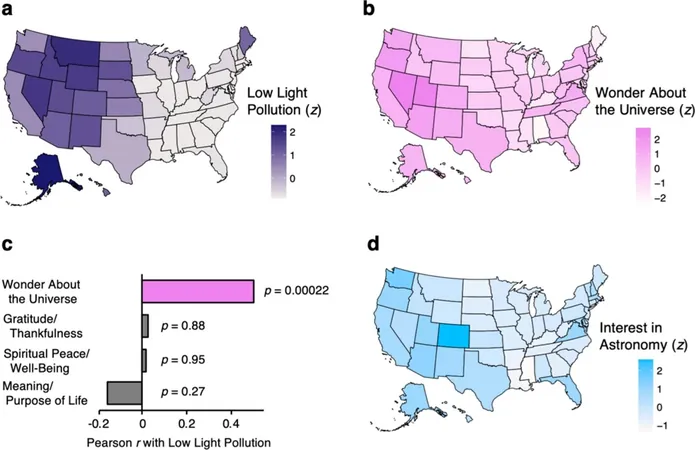
Are Stars Just a Distant Dream? Researchers Uncover Alarming Links Between Light Pollution and Astronomy Interest!
2024-10-02
Picture stepping outside on a crisp, clear night. You gaze up, hoping to see the shimmering stars or perhaps even the glow of a distant planet, and you feel an overwhelming sense of wonder. Exciting new research from the University of Washington suggests that this magical experience is more than just a fleeting moment; it could ignite a lifelong passion for science!
Rodolfo Cortes Barragan, a research scientist at the UW Institute for Learning and Brain Sciences (I-LABS), alongside Andrew Meltzoff, co-director of I-LABS and esteemed psychology professor, has co-authored a groundbreaking study published in Scientific Reports. Their findings reveal a startling correlation between low light pollution and increased interest in astronomy—a connection that may have profound implications for how we inspire future generations in science and education.
The Insight Behind the Study: Why Light Pollution Matters
Barragan explains that as psychologists, they recognize that environmental changes can shape human behavior. However, the effects of light pollution—frequently overlooked in social sciences—could play a critical role in shaping scientific interest and exploration. The researchers focused on how light pollution impacts emotions and behaviors, emphasizing its significant yet often ignored influence on psychological and scientific engagement.
Meltzoff notes that astronomy serves as an essential "gateway" to science for many people, especially young children. The sight of a star-studded sky captivates imagination, stirring curiosity about the universe and one’s own existence. Many renowned scientists attribute their early interest in science to such experiences, emphasizing the necessity of scientific validation for this phenomenon.
What Does "Wonder" Mean?
So, what exactly is the feeling of wonder? Barragan defines it as a rich combination of awe, amazement, and an insatiable desire to learn more. Using data from a nationally representative survey by the Pew Research Center involving over 35,000 U.S. residents, the researchers established a poignant link: regions with lower light pollution correlate with heightened feelings of wonder about the universe, directly influencing engagement in astronomy-related activities.
The results are striking: individuals in areas with lower light pollution exhibit higher behavioral interest in astronomy—measured through various activities, including searching for astronomy topics online, signing up to have their names sent to Mars aboard the Perseverance rover, and aspiring to become a NASA astronaut.
An Equity Issue? The Unequal Access to the Night Sky
But there's a more significant issue lurking beneath the surface: equity in access to the night sky. Barragan stresses that all children and adults deserve equal opportunities for inspiration and scientific exploration. Unfortunately, the study indicates that geographical disparities in the U.S. mean that some populations have far less access to dark skies. This inequity may thwart the curiosity that drives scientific engagement.
Meltzoff adds that for children who grow up without seeing the stars, the likelihood of posing questions about the universe diminishes. The magic of witnessing constellations like the Milky Way or the Big Dipper can be a transformative experience that inspires countless inquiries about space and science.
The Bigger Picture: Sparking Curiosity in Science!
The overarching message from this study is a clarion call for further research into the intertwining realms of psychology and astronomy. Barragan hopes this work will stimulate an "I wonder" response across the scientific community, fostering interdisciplinary collaboration that bridges the arts and sciences.
Meltzoff beautifully encapsulates the essence of the research: it merges the wonders of the cosmos with human behavior. The fundamental question remains—how can we connect these realms to inspire curiosity and scientific exploration in future generations?
As we move forward, it becomes essential to address light pollution, not only for the sake of preserving our night skies but also for fostering a deeper appreciation of science among all individuals. The question remains: how can we ensure that every child has the opportunity to wonder and explore the universe? The clock is ticking, and the stars await!



 Brasil (PT)
Brasil (PT)
 Canada (EN)
Canada (EN)
 Chile (ES)
Chile (ES)
 España (ES)
España (ES)
 France (FR)
France (FR)
 Hong Kong (EN)
Hong Kong (EN)
 Italia (IT)
Italia (IT)
 日本 (JA)
日本 (JA)
 Magyarország (HU)
Magyarország (HU)
 Norge (NO)
Norge (NO)
 Polska (PL)
Polska (PL)
 Schweiz (DE)
Schweiz (DE)
 Singapore (EN)
Singapore (EN)
 Sverige (SV)
Sverige (SV)
 Suomi (FI)
Suomi (FI)
 Türkiye (TR)
Türkiye (TR)